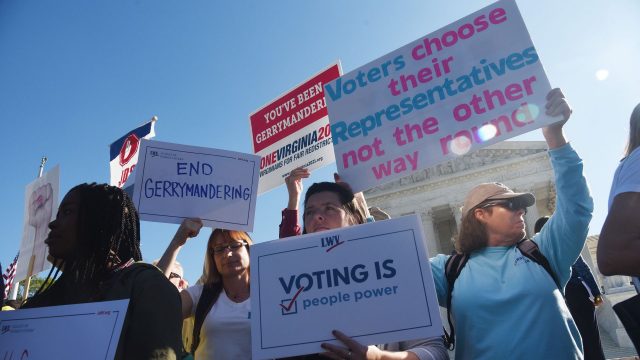Slay the Dragon: Hate the Game, by David Bax

This film’s release date has been pushed to April 3, 2020
As a work of cinema, Chris Durrance and Barak Goodman’s Slay the Dragon is largely indistinguishable from any other mainstream documentary of our moment. It’s got the talking heads and the plinky, plucky score and, oh boy, you better believe it’s got drone shots. But as a persuasive and accessible work of issue advocacy, it’s urgent and, dare I say, important.
“Gerrymandering” is the term for politically motivated redistricting. You probably already know that but the film wisely assumes you don’t in order to best make its case from the ground up. In 80% of U.S. states, according to Slay the Dragon, it is the party in power who is in charge of redrawing the district lines after each census. It’s a self-evidently terrible practice so easily corruptible that it’s shocking it was ever instituted in the first place. It allows politicians to consolidate power and disenfranchise the opposition. It’s how, for instance, you get states like Wisconsin where, even when more Democrats cast votes in the 2012 election, the Republicans still manage to gain seats in the state legislature.
Using examples like that, Durrance and Goodman are, thankfully, not disingenuously non-partisan. They may focus their narrative on a non-partisan non-profit, Voters Not Politicians, and include evidence of Democratic gerrymandering, from President Reagan decrying the abuse of the practice in 1980s California to the egregiously redrawn state of Maryland post-2010. But Slay the Dragon focuses on recent Republican gerrymandering in a way that is honest and allows them to highlight illustrations of how undemocratic the method is and could be in any party’s hands.
Slay the Dragon‘s argument is that gerrymandering itself is bad, not necessarily the people who exploit it. That’s how they’re able to get the eager participation of someone like Chris Jankowski, who spearheaded the 2010 “Redmap” initiative, a massive, nationwide effort to pour campaign money into key 2010 elections for the express purpose of gerrymandering once they’d won the seats. Durrance and Goodman aren’t mad at Jankowski. On the contrary, they seem impressed at his and his party’s ability to play a long game by the cold numbers. If it’s not against the law to count cards, you can’t be mad at the people who do it.
You can and, in Slay the Dragon‘s view, should be mad, however, at the result, which is essentially rule by a powerful, self-interested ideological minority similar, in that respect, to apartheid. I don’t make the comparison lightly. One party being unanswerable to half or more of the electorate means that candidates like Mark Meadows, who perpetuated racist “birther” notions about Barack Obama, get easily elected.
When people and laws that are unpopular to most voters still get passed, it’s clear that gerrymandering is a threat to democratic ideals with no ethical defense. And yet there is no legislative solution. That would mean trusting those who benefit from it to give up that advantage. The fix has to come from the people and through the courts. The best way to get started is to tell as many people as you can to see Slay the Dragon as soon as possible.

























